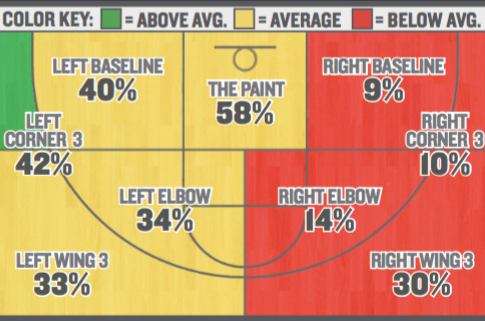
June 14, 2016
Strictly from a draft tier standpoint, the Sixers’ decision to bring in Jaylen Brown to work out on Tuesday was a bit curious. Brown won’t be the top pick in next week's NBA Draft, and he will also be long gone by the time 24 and 26 roll around.
So why was Brown all by himself at PCOM this afternoon, running many of the same drills Brandon Ingram went through yesterday?
“It’s just another prospect we wanted to see and bring in to Philadelphia,” Sixers vice president of player personnel Marc Eversley said. “He’s one of those guys who is up in that area we’re looking at. He’s a high-level prospect.
“We just wanted to get him here in Philly and take another look at him.”
Behind Ingram, Brown is the second-highest rated prospect that the Sixers have welcomed into their gym (at least publicly). The 6’7” small forward is rated as the No. 5 overall prospect by Draft Express, and his presence in Philly could signal that the front office is looking to trade back into the lottery.
(As a bit of housekeeping, Brown is also dealing with a sore right shoulder after “bumping it in a few workouts.”)
Brown, who doesn’t lack for confidence, currently has no other workouts scheduled. Previously, the Cal product worked out for Los Angeles (2), Boston (3), Phoenix (4), and New Orleans (6), which gives you a feel for his draft range. Brown said that while the Sixers didn’t give him much feedback, he doesn’t necessarily agree with the opening paragraph of this post.
“For me, it’s just about letting them know who I am and they’re telling me about them and what they see me doing and things like that,” Brown said. “I think the reason why I’m here is maybe I can be in contention to be the number one pick in the draft.”
The reason why Brown likely isn’t in contention at the top of the draft is his shooting stroke. He had an ugly 51.8 percent true shooting percentage as a freshman, which included a 65-percent mark from the line and 29-percent mark from three-point range.
There are other problems too, like his shot selection and general approach to the offensive end of the floor. But if Brown was a better shooter, teams would likely be more willing to look past some of those flaws because of his excellent size and athleticism. If this were baseball, Brown would be considered a toolsy prospect, the type that the old scouts in Moneyball drooled over.
One thing I found particularly interesting is how much better Brown was shooting from the left side of the floor (via Kevin O’Connor’s excellent draft guide):
Eversley said that Brown shot the ball well (and he did make some shots in the little bit of the workout I got to watch), noting that his arc had perhaps improved.
“There’s a lot of misconceptions about if I can shoot the ball,” Brown said. “I think shooting it 29 percent leaving college and coming to the NBA three-point line, they want to see the transition. I think I’m shooting the ball well above the expectations.”
Earlier in the day, the Sixers worked out more players that are in the second round and undrafted range: Michael Bryson (UC Santa Barbara), A.J. English (Iona), Tomasz Gielo (Mississippi), Georges Niang (Iowa State), Dyshawn Pierre (Dayton), and Jarrod Uthoff (Iowa).
Tomorrow, they’ll bring in similar prospects: Bryn Forbes (Michigan State), Grandy Glaze (Grand Canyon), Stefan Jankovic (Hawaii), Retin Obasohan (Alabama), David Walker (Northeastern), and Stephen Zimmerman (UNLV).
Follow Rich on Twitter: @rich_hofmann
